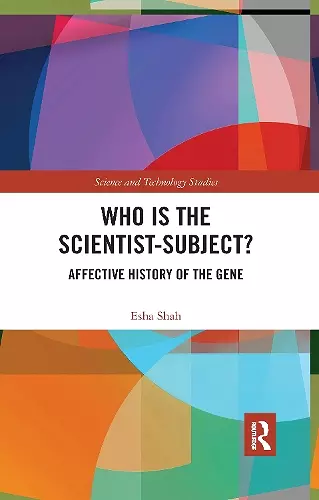Who is the Scientist-Subject?
Affective History of the Gene
Format:Paperback
Publisher:Taylor & Francis Ltd
Published:18th Dec '20
Currently unavailable, and unfortunately no date known when it will be back
This paperback is available in another edition too:
- Hardback£145.00(9781138570337)

This book explores two disparate sets of debates in the history and philosophy of the life sciences: the history of subjectivity in shaping objective science and the history of dominance of reductionism in molecular biology. It questions the dominant conception of the scientist-subject as a neo-Kantian ideal self – that is, the scientist as a unified and wilful, self-determined, self-regulated, active and autonomous, rational subject wilfully driven by social and scientific ethos – in favour of a narrative that shows how the microcosm of reductionism is sustained, adopted, questioned, or challenged in the creative struggles of the scientist-subject.
The author covers a century-long history of the concept of the gene as a series of "pioneering moments" through an engagement with life-writings of eminent scientists to show how their ways of being and belonging relate with the making of the science. The scientist-self is theorized as fundamentally a feeling, experiencing, and suffering subject split between the conscious and unconscious and constitutive of personality aspects that are emotional/psychological, "situated" (cultural and ideological), metaphysical, intersubjective, and existential at the same time.
An engaging interdisciplinary interpretation of the dominance of reductionism in genetic science, this book will be of major interest to scholars and researchers of science, history, and philosophy alike.
"Esha Shah richly demonstrates how the 'ways of being and belonging' affect the 'structures' of rational cognition and how the method and philosophy of reductionism stand determined by 'affective' scientific self. Drawing widely on the history of science, auto/biographies, psychoanalysis, and metaphysics, she shows how preference for unity and order, fascination for immortality, and love of complexity have shaped the scientific estate. The bonds of love often overcome the hegemony of gene. This is an incredible feat of feminist social epistemology and a sustained provocation to historiographical doxa." Upendra Baxi, Emeritus Professor of Law, University of Warwick, UK, and University of Delhi, India
ISBN: 9780367734435
Dimensions: unknown
Weight: 453g
188 pages